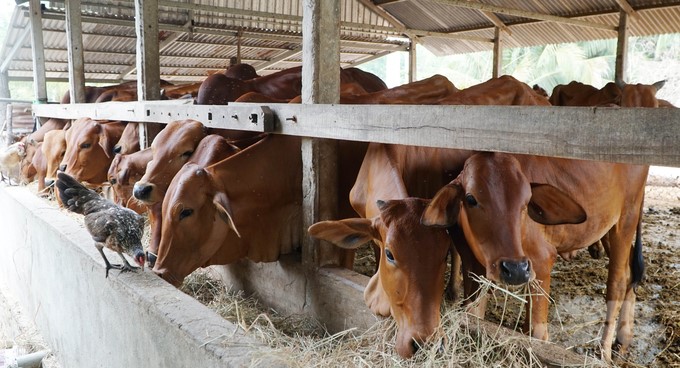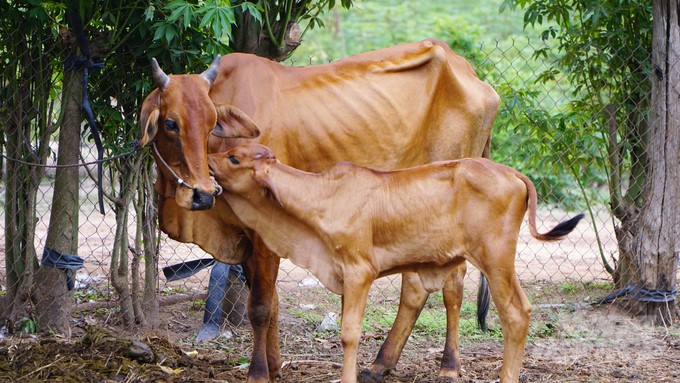May 20, 2025 | 21:23 GMT +7
May 20, 2025 | 21:23 GMT +7
Hotline: 0913.378.918
May 20, 2025 | 21:23 GMT +7
Hotline: 0913.378.918

Mr. Dang Van Tro: "If flies, mosquitoes, and crawling insects are not well controlled, the cow herd will be very susceptible to diseases."
Mr. Dang Van Tro (group 10, Thanh Phu hamlet, Tan Hiep commune, Tan Chau district) has a large herd of cows in the commune. Mr. Tro has been raising beef cattle since 1977 and is one of the households that has been involved in beef cattle farming for the longest time in the locality. Thanks to the cow, his family has money to build a house and spare for their children.
In recent years, due to his old age, cow farming has mostly been in charge of his son. Since switching to breeding cows, the cow herd of Mr. Tro's family has increased and decreased continuously, but always has around 30 heads.
Before the lumpy skin disease appeared in Tay Ninh, Mr. Tro's family always focused on cleaning the barn, disinfecting, and preventing diseases according to the instructions of livestock and veterinary officers.
Mr. Tro and his child even designed the cow herd's eating area to be separate from the sleeping area. To avoid flies and mosquitoes affecting the cows, Mr. Tro and his child regularly fumigate the barn, using dry grass and rice husks in the corners of the walls to repel insects.
"Every week, my child often sprays insect repellant several times to eliminate flies and mosquitoes that transmit diseases. Plus, the barn is cleaned every day, so there are very few insects. During the day, the cow herd is led out to a cool yard to avoid being cramped," said Mr. Tro.

The cow herd of Mr. Tro's family always has around 30 heads, which grow healthily, rarely get sick, and have good productivity. Photo: Le Binh.
According to the Tay Ninh Sub-Department of Animal Husbandry and Veterinary Medicine, at the end of 2021, the lumpy skin disease attacked many districts of Tay Ninh province. There were about 7,500 buffalos and cows infected with the disease. More than 1,000 of them died due to infection, causing great damage to people.
The cow herds of many farming households next to Mr. Tro's house were also infected during that time, forcing a lot of them to be destroyed. However, his cow herd was still healthy and disease-free. Realizing the dangerous situation, Mr. Tro decided to cut off the intermediate source of infection from biting insects such as mosquitoes, flies, and ticks and avoid contact. His cow herd was in the state of "no one goes in or out."
"At that time, my family cleared the bushes and trees around the barn area to avoid shelters for insects. The corners of the barn were also fumigated with herbs rich in essential oils to repel mosquitoes. The inside of the barn is sprinkled with lime powder and limits the shared use of drinking troughs and feeding areas,” shared Mr. Tro.
Mr. Tro was advised to have his cow herd vaccinated to promptly protect them. Since then, each of the family's cows has always been vaccinated according to the instructions of the local veterinary force.
According to Mr. Do Anh Tuan, Head of the Veterinary Medicine Department of Tan Hiep commune, Tan Chau district, this is a household that complies quite well with disinfecting the barn and vaccinating the cow herd. Even if the vaccine is vaccinated through socialization or from the local budget, the farming household is still fully registered.

For many years, Tay Ninh has not recorded the lumpy skin disease in cattle herds. Photo: Le Binh.
Tay Ninh has not detected a new case of lumpy skin disease in the entire province for a long time. However, the specialized sector still warns that the risk of the disease recurring is very high because the pathogen of lumpy skin disease exists for a long time. In particular, the spread mechanism of this disease is very diverse, through many types of sucking insects, causing cattle to become infected.
According to the plan, in 2024, Tay Ninh plans to inject 31,370 doses of lumpy skin vaccine for cattle herds. Subjects receiving free vaccination support include buffaloes and cows of livestock households with a total herd of less than 8 heads. For herds of buffaloes and cows with a total herd of 8 heads or more, the owner of the livestock household takes care of the vaccination costs by themselves.
According to Ms. Nguyen Thi Hong Loan, Director of the Tay Ninh Sub-Department of Animal Husbandry and Veterinary Medicine, in addition to biosafety farming measures, farmers should pay attention to registering for vaccination of breeding calves and cows. Because according to regulations, calves under 6 months old and cows about to give birth have not been vaccinated.
“These are the subjects with the highest death rate during the recent epidemic period. Breeders who need to buy vaccines and learn how to use vaccines can contact the livestock and veterinary stations or commune veterinary officers for dedicated guidance," Ms. Loan informed.
Translated by Thu Huyen

(VAN) Japan's grant aid project contributes to capacity building, promoting organic agricultural production, and fostering sustainable community development in Dong Thap province.

(VAN) For years, the CRISPR-Cas9 genome technology has been reshaping genetic engineering, a precision tool to transform everything from agriculture to medicine.

(VAN) Vietnam aims to become a 'leader' in the region in the capacity and managing effectively soil health and crop nutrition.
![Reducing emissions from rice fields: [Part 1] Farming clean rice together](https://t.ex-cdn.com/nongnghiepmoitruong.vn/608w/files/news/2025/05/05/z6509661417740_a647202949c539012a959e841c03e1d3-nongnghiep-143611.jpg)
(VAN) Growing clean rice helps reduce environmental pollution while increasing income, allowing farmers to feel secure in production and remain committed to their fields for the long term.
/2025/05/19/5136-1-144800_230.jpg)
(VAN) The Nghe An Provincial People's Committee has just approved the list of beneficiaries eligible for revenue from the Emission Reductions Payment Agreement (ERPA) in the North Central region for the year 2025.

(VAN) 14 out of 35 domesticated elephants in Dak Lak province have had their living conditions improved, with 11 of them currently participating in the non-riding elephant tourism model.

(VAN) Muong Nhe Nature Reserve hopes that being upgraded to a national park will lay the foundation for forest protection efforts to be carried out in a systematic, modern, and sustainable manner.